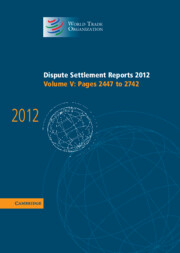Book contents
- Frontmatter
- Table of Contents
- United States — Certain Country of Origin Labelling (COOL) Requirements (WT/DS384, WT/DS386) Reports of the Appellate Body
- Table of Contents
- CASES CITED IN THESE REPORTS
- PANEL EXHIBITS REFERRED TO IN THESE REPORTS
- ABBREVIATIONS USED IN THESE REPORTS
- I INTRODUCTION
- II ARGUMENTS OF THE PARTICIPANTS AND THE THIRD PARTICIPANTS
- III ISSUES RAISED IN THIS APPEAL
- IV BACKGROUND AND OVERVIEW OF THE MEASURES AT ISSUE
- V ARTICLE 2.1 OF THE TBT AGREEMENT
- VI ARTICLE 2.2 OF THE TBT AGREEMENT
- VII ARTICLE III:4 OF THE GATT 1994
- VIII ARTICLE XXIII:1(B) OF THE GATT 1994
- IX FINDINGS AND CONCLUSIONS
- X FINDINGS AND CONCLUSIONS
- ANNEX I NOTIFICATION OF AN APPEAL BY THE UNITED STATES
- ANNEX II NOTIFICATION OF AN OTHER APPEAL BY CANADA
- ANNEX III NOTIFICATION OF AN OTHER APPEAL BY MEXICO
- ANNEX IV PROCEDURAL RULING AND ADDITIONAL PROCEDURES REGARDING PUBLIC OBSERVATION OF THE ORAL HEARING
- Cumulative List of Published Disputes
II - ARGUMENTS OF THE PARTICIPANTS AND THE THIRD PARTICIPANTS
Published online by Cambridge University Press: 13 December 2017
- Frontmatter
- Table of Contents
- United States — Certain Country of Origin Labelling (COOL) Requirements (WT/DS384, WT/DS386) Reports of the Appellate Body
- Table of Contents
- CASES CITED IN THESE REPORTS
- PANEL EXHIBITS REFERRED TO IN THESE REPORTS
- ABBREVIATIONS USED IN THESE REPORTS
- I INTRODUCTION
- II ARGUMENTS OF THE PARTICIPANTS AND THE THIRD PARTICIPANTS
- III ISSUES RAISED IN THIS APPEAL
- IV BACKGROUND AND OVERVIEW OF THE MEASURES AT ISSUE
- V ARTICLE 2.1 OF THE TBT AGREEMENT
- VI ARTICLE 2.2 OF THE TBT AGREEMENT
- VII ARTICLE III:4 OF THE GATT 1994
- VIII ARTICLE XXIII:1(B) OF THE GATT 1994
- IX FINDINGS AND CONCLUSIONS
- X FINDINGS AND CONCLUSIONS
- ANNEX I NOTIFICATION OF AN APPEAL BY THE UNITED STATES
- ANNEX II NOTIFICATION OF AN OTHER APPEAL BY CANADA
- ANNEX III NOTIFICATION OF AN OTHER APPEAL BY MEXICO
- ANNEX IV PROCEDURAL RULING AND ADDITIONAL PROCEDURES REGARDING PUBLIC OBSERVATION OF THE ORAL HEARING
- Cumulative List of Published Disputes
Summary
Claims of Error by the United States – Appellant
1. Article 2.1 of the TBT Agreement
17. The United States requests the Appellate Body to reverse the Panel's finding that the COOL measure is inconsistent with Article 2.1 of the TBT Agreement with regard to muscle cuts of meat, in particular the finding that the measure accords less favourable treatment to imported livestock than domestic livestock. The United States argues that the Panel's finding was based on “a faulty and unprecedented legal test” for the assessment of less favourable treatment and on a failure to make an objective assessment of facts related to segregation, commingling, and the price differential in the US livestock market.
(a) The Interpretation and Application of Article 2.1 of the TBT Agreement
18. The United States submits that, in order to determine whether a measure accords less favourable treatment to imported products under Article 2.1 of the TBT Agreement, the Panel should have followed past Appellate Body and panel reports in Thailand – Cigarettes (Philippines), Korea – Various Measures on Beef, and Dominican Republic – Import and Sale of Cigarettes. According to the United States, these reports generally focused on: (i) “whether the measure itself treats imported products differently and less favorably than domestic like products on the basis of their origin”; and (ii) “to the extent that there are adverse effects on imported products, whether these effects are attributable to the measure itself or are based on external non-origin related factors, such as pre-existing market conditions and the independent actions of private market actors.”
- Type
- Chapter
- Information
- Dispute Settlement Reports 2012 , pp. 2481 - 2572Publisher: Cambridge University PressPrint publication year: 2014



